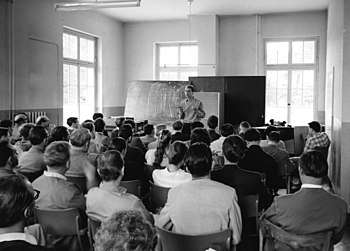Ausmultiplikation
Ausmultiplikation (literally, "multiplying-out") is a German term used by the composer Karlheinz Stockhausen to describe a technique in which a long note is replaced by shorter "melodic configurations, internally animated around central tones", resembling the ornamental technique of divisions (also called "diminutions") in Renaissance music. Stockhausen first described this technique in connection with his "opus 1", Kontra-Punkte, composed in 1952–53 (Stockhausen 1989, 323–24), but in his later formula composition there is a related method of substituting a complete or partial formula for a single very long tone in a much slower, "more background" projection of the formula (Kohl 1990, 281). When this is done at more than one level, the result is reminiscent of a fractal (Hartwell 2012, 394).

Sources
- Hartwell, Robin. 2012. "Threats and Promises: Lucifer, Hell, and Stockhausen's Sunday from Light". Perspectives of New Music 50, nos. 1 & 2 (Winter–Summer): 393–424.
- Kohl, Jerome. 1990. "Into the Middleground: Formula Syntax in Stockhausen's Licht". Perspectives of New Music 28, no. 2 (Summer): 262–91.
- Stockhausen, Karlheinz. 1989. "Wille zur Form und Wille zum Abenteuer". In his Texte zur Musik 6, edited by Christoph von Blumröder, 320–46. DuMont Dokumente. Cologne: DuMont Buchverlag. ISBN 3-7701-2249-6.